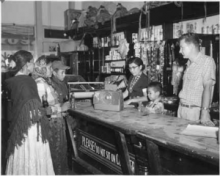Article
A trading post is an establishment where goods can be traded. It is also a social center where news and gossip are exchanged. Trading posts have been associated with American frontier culture since the seventeenth century. Over time, trading posts developed into a cultural institution at first funded and backed by empire, later by national interests, and most often by enterprising business men.
Trading posts became centralized hubs in a network of exchange that both participated with and circumvented the burgeoning capitalist system that was imported into the Americas along with settler colonialism. Although trading posts were initially intended to provide support to the European traders and trappers who traced their way across the North American continent, Native American groups were also drawn into the posts' exchange network. Native Americans traded furs, pelts, and even scalps for finished goods such as steel knives, firearms, woven textiles, food stuffs, and alcohol. Although not every post was poorly managed, trading posts earned a nefarious reputation for taking advantage of Native traders by offering poor exchange rates, trading products that were infected with diseases, and promoting the purchase and use of alcohol.
Many trading posts are still in existence. In the Southwest, they still symbolize "the frontier" as they are located as at the dividing line between "wilderness" (Indian country) and "civilization." Today, trading posts can be reached by pickup truck, tourist RV, and even the occasional horse. Many trading posts are also preserved as National Historic Sites.
"Listening to "The Voice of the Navajo People" on the radio at Ben Turpin's trading Post, Gallup, New Mexico.," photograph, (059296). Palace of the Governors Photo Archive, New Mexico History Museum. Use with permission only.
Manuscripts
A01 The Blessing Way (01-07) p. 34
A01 The Blessing Way (01-07) p. 37
A01 The Blessing Way (01-07) p. 38
A01 The Blessing Way (01-07) p. 39
A01 The Blessing Way (01-07) p. 62
A01 The Blessing Way (01-07) p. 63
A01 The Blessing Way (01-07) p. 64
A01 The Blessing Way (01-07) p. 75
A01 The Blessing Way (01-07) p. 237
A05 Listening Woman (02-13) p. 46
A05 Listening Woman (02-13) p. 54
A05 Listening Woman (02-13) p. 55
A05 Listening Woman (02-13) p. 65
A05 Listening Woman (02-13) p. 73
A05 Listening Woman (02-13) p. 83
A06 People of Darkness (03-06) p. 113
A06 People of Darkness (03-06) p. 119
A06 People of Darkness (03-06) p. 242
A06 People of Darkness (03-06) p. 243
A06 People of Darkness (03-06) p. 247
A06 People of Darkness (03-06) p. 250
A06 People of Darkness (03-06) p. 265
A07 The Dark Wind (04-06) p. 34
A07 The Dark Wind (04-06) p. 54
A07 The Dark Wind (04-06) p. 63
A07 The Dark Wind (04-06) p. 85
A07 The Dark Wind (04-06) p. 117
A07 The Dark Wind (04-06) p. 135
A07 The Dark Wind (04-06) p. 139
A07 The Dark Wind (04-06) p. 152
A07 The Dark Wind (04-06) p. 175
A07 The Dark Wind (04-06) p. 216
A07 The Dark Wind (04-06) p. 219
A07 The Dark Wind (04-06) p. 221
A07 The Dark Wind (04-06) p. 243
References
Cottam, Erica
2015 Hubbell Trading Post: Trade, Tourism, and the Navajo Southwest. Norman:
University of Oklahoma Press.
Turner, Frederick Jackson
1977 The Character and Influence of the Indian Trade in Wisconsin: A Study of the
Trading Post as an Institution. Norman: University of Oklahoma Press.

